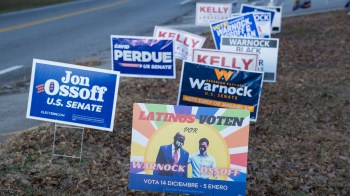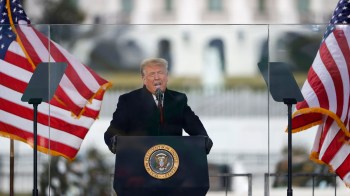Kai Ryssdal: And it’s all over in Iowa — but the countin’, that is. The caucuses are tonight. The first actual votes in a campaign that already feels long.
Despite the various ups and downs, though, the Republican candidates are getting something of a bargain this year. This has been so far the cheapest primary season in more than a decade. Marketplace’s Nancy Marshall Genzer reports.
Nancy Marshall Genzer: I love a bargain, and free stuff. If I were campaigning for president this year, I’d be in seventh heaven. I’d be getting lots of TV exposure at no cost.There’ve been more debates than usual.
All the debate dust-ups have actually made them interesting TV. The candidates drew big audiences.
Alex Vogel: And that was absolutely free. All they have to do is show up.
That’s Republican strategist Alex Vogel. He says there’s more free TV on cable news shows. And then there’s the overall mood of the voters.
Vogel: Most of the focus of normal, average Americans has been on the economy. Look, if you’re a campaign, why waste money when people aren’t paying attention?
Vogel says voters are just starting to pay attention. So, we’ll be hearing more campaign ads like this one, bashing Newt Gingrich.
Advertisement: Newt has more baggage than the airlines.
That sounds like the type of ad one of Gingrich’s rivals would pay for. So, are the candidates finally opening their wallets? Nope.
Advertisement: Restore Our Future is responsible for the content of this message.
Restore our Future is a super PAC which supports Mitt Romney. It paid for the ad. Super PACS are new, independent groups that can raise and spend unlimited amounts of money. They’re not supposed to coordinate with the campaigns.
Sheila Krumholz heads the Center for Responsive Politics. She says the candidates can just stand back let the super PACs run expensive ads on their behalf.
Sheila Krumholz: We’ll have these outside groups promoting specific candidates. And that really becomes an extension of the candidates’ campaign.
Political strategist Jordan Lieberman says that way candidates can save their money until later in the campaign. Right now, candidate spending is lower now than it was four years ago. But Lieberman says the campaign is just heating up, and he still expects spending for this election to break the 2008 record.
Jordan Lieberman: Will we spend more than $1.7 billion in the 2012 campaign cycle? I promise you, yes.
Lieberman says campaign spending has gone up every year since 1984. If candidates have money in the bank, they will eventually spend it — on TV ads, staff, consultants, chartered jets and fancy hotels.
In Washington, I’m Nancy Marshall Genzer for Marketplace.
Ryssdal: Nancy talked about negative ads? Here’s a dollar figure to give you a little context. According to the research group Kantar Media, almost $6 million was spent on political TV ads in Iowa last year. Almost $4 million of it for negative spots.
There’s a lot happening in the world. Through it all, Marketplace is here for you.
You rely on Marketplace to break down the world’s events and tell you how it affects you in a fact-based, approachable way. We rely on your financial support to keep making that possible.
Your donation today powers the independent journalism that you rely on. For just $5/month, you can help sustain Marketplace so we can keep reporting on the things that matter to you.


















